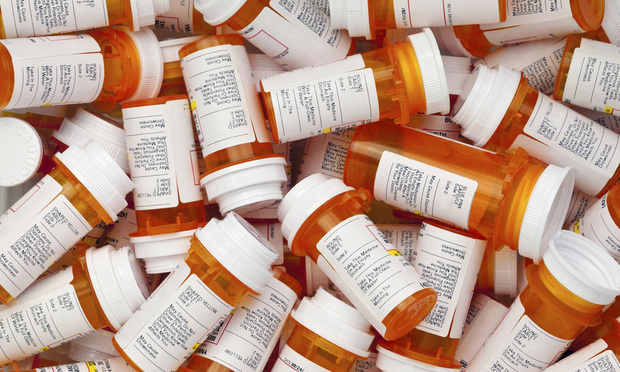DEA's Proposed 'Two Option' Format for Suspicious Order Reporting Is the Wrong Option
A more comprehensive solution, one that unites disparate stakeholders and data sets in a committed public-private partnership, is necessary to stem the ongoing opioid epidemic.
May 13, 2021 at 10:00 AM
11 minute read
Pharmaceuticals
On Nov. 2, 2020, the Drug Enforcement Administration (DEA) published notice of a new Proposed Rule, "Suspicious Orders of Controlled Substances," to "clarify the procedures a registrant must follow for orders received under suspicious circumstances." 85 Fed. Reg. 69282, 69284 ("Proposed Rule").
DEA's purported "clarification" of those obligations, however, includes an entirely new framework that not only is inconsistent with prior DEA guidance as to registrants' suspicious order reporting obligations, but more fundamentally represents a lost opportunity to achieve meaningful change. It remains to be seen whether the extended public comment period for the Proposed Rule will be further extended, however, a more comprehensive solution, one that unites disparate stakeholders and data sets in a committed public-private partnership, is necessary to stem the ongoing opioid epidemic.
This content has been archived. It is available through our partners, LexisNexis® and Bloomberg Law.
To view this content, please continue to their sites.
Not a Lexis Subscriber?
Subscribe Now
Not a Bloomberg Law Subscriber?
Subscribe Now
NOT FOR REPRINT
© 2025 ALM Global, LLC, All Rights Reserved. Request academic re-use from www.copyright.com. All other uses, submit a request to [email protected]. For more information visit Asset & Logo Licensing.
You Might Like
View All


First-of-Its-Kind Parkinson’s Patch at Center of Fight Over FDA Approval of Generic Version
3 minute read
Pharma Giants File Patent Infringement Suit Against India-Based Drugmaker Over IBS Medication
3 minute readTrending Stories
- 1The Coordinate Jurisdiction Rule on Insurance Bad Faith Litigation
- 2South Carolina Physicians Challenge Abortion Ban Under Religious Freedom Claims
- 3Special Series Part 5: The State’s Bond Lock Impermissibly Delegates Legislative Authority
- 4President-Elect Donald Trump Sentenced to Unconditional Discharge
- 5JCPenney Customer's Slip-and-Fall From Bodily Substance Suit Best Left for a Jury to Decide, Judge Rules
Who Got The Work
Michael G. Bongiorno, Andrew Scott Dulberg and Elizabeth E. Driscoll from Wilmer Cutler Pickering Hale and Dorr have stepped in to represent Symbotic Inc., an A.I.-enabled technology platform that focuses on increasing supply chain efficiency, and other defendants in a pending shareholder derivative lawsuit. The case, filed Oct. 2 in Massachusetts District Court by the Brown Law Firm on behalf of Stephen Austen, accuses certain officers and directors of misleading investors in regard to Symbotic's potential for margin growth by failing to disclose that the company was not equipped to timely deploy its systems or manage expenses through project delays. The case, assigned to U.S. District Judge Nathaniel M. Gorton, is 1:24-cv-12522, Austen v. Cohen et al.
Who Got The Work
Edmund Polubinski and Marie Killmond of Davis Polk & Wardwell have entered appearances for data platform software development company MongoDB and other defendants in a pending shareholder derivative lawsuit. The action, filed Oct. 7 in New York Southern District Court by the Brown Law Firm, accuses the company's directors and/or officers of falsely expressing confidence in the company’s restructuring of its sales incentive plan and downplaying the severity of decreases in its upfront commitments. The case is 1:24-cv-07594, Roy v. Ittycheria et al.
Who Got The Work
Amy O. Bruchs and Kurt F. Ellison of Michael Best & Friedrich have entered appearances for Epic Systems Corp. in a pending employment discrimination lawsuit. The suit was filed Sept. 7 in Wisconsin Western District Court by Levine Eisberner LLC and Siri & Glimstad on behalf of a project manager who claims that he was wrongfully terminated after applying for a religious exemption to the defendant's COVID-19 vaccine mandate. The case, assigned to U.S. Magistrate Judge Anita Marie Boor, is 3:24-cv-00630, Secker, Nathan v. Epic Systems Corporation.
Who Got The Work
David X. Sullivan, Thomas J. Finn and Gregory A. Hall from McCarter & English have entered appearances for Sunrun Installation Services in a pending civil rights lawsuit. The complaint was filed Sept. 4 in Connecticut District Court by attorney Robert M. Berke on behalf of former employee George Edward Steins, who was arrested and charged with employing an unregistered home improvement salesperson. The complaint alleges that had Sunrun informed the Connecticut Department of Consumer Protection that the plaintiff's employment had ended in 2017 and that he no longer held Sunrun's home improvement contractor license, he would not have been hit with charges, which were dismissed in May 2024. The case, assigned to U.S. District Judge Jeffrey A. Meyer, is 3:24-cv-01423, Steins v. Sunrun, Inc. et al.
Who Got The Work
Greenberg Traurig shareholder Joshua L. Raskin has entered an appearance for boohoo.com UK Ltd. in a pending patent infringement lawsuit. The suit, filed Sept. 3 in Texas Eastern District Court by Rozier Hardt McDonough on behalf of Alto Dynamics, asserts five patents related to an online shopping platform. The case, assigned to U.S. District Judge Rodney Gilstrap, is 2:24-cv-00719, Alto Dynamics, LLC v. boohoo.com UK Limited.
Featured Firms
Law Offices of Gary Martin Hays & Associates, P.C.
(470) 294-1674
Law Offices of Mark E. Salomone
(857) 444-6468
Smith & Hassler
(713) 739-1250






